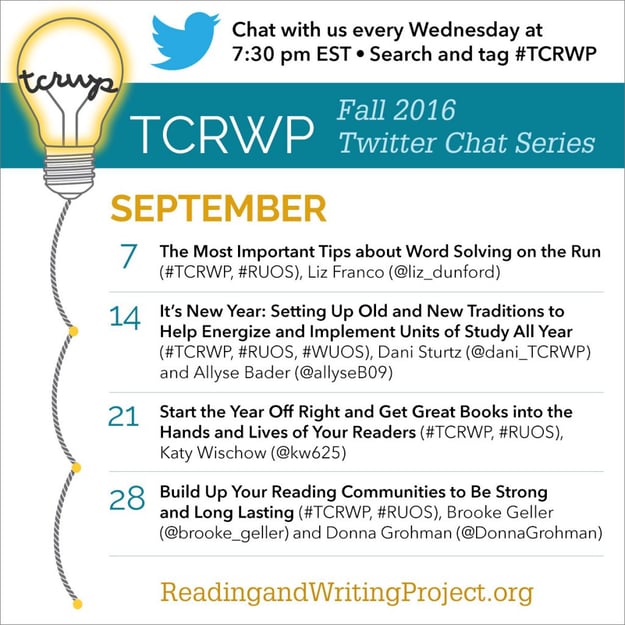
TCRWP Twitter Chat: Build Up Your Reading Communities to Be Strong and Long Lasting
by Anna Gratz Cockerille
Learning to Read is a powerful, emotional, complex, and miraculous thing. Children engaged in the reading process are in the process of changing. They are changing what they understand about the world. They are changing the kind of information they take in and process. And, in some respects, they are even changing who they are as individuals.
Reading, of course, is so much more than getting better at decoding. When children are undergoing a change as complex and as life-chaging as learning to read, they need to surrounded by support, camaraderie, and care. Certainly, great reading teachers provide all of this and more. In addition, students themselves can learn to become crucial supports for each other.
Consider for a moment how you have felt when you have read as part of a community. In A Guide to The Reading Workshop, Lucy Calkins writes, “If you’ve had the exquisite pleasure of sharing reading—in a book club, a Bible study group, a women’s group, a writing group, or a friendship that includes books—then the social fabric of reading will be part of what makes reading work for you (p. 2-3).” And so it is too with many young readers. Because they connect through books, and not only through books but also through the process of learning to read, their reading experience is that much richer.
Some key characteristics of a great reading community:
- Members understand and support each others’ goals.
- Members respect different reading styles and approaches.
- Members talk often and thoughtfully about their reading.
- Members are comfortable enough to be honest about their struggles.
- Members can ask each other for help when the going get tough.
Top of the list for reading teachers at the start of the year is to cultivate a this kind of reading community. Through carefully crafted partnerships, lessons that support goal-setting and community-building, and honest conversations about the reading process, teachers lay the foundation at the start of the year for trust, collaboration, and understanding among students.
This week, Senior Lead Staff Developer Brooke Geller and Literacy Coach Donna Grohman will lead the TCRWP community in a Twitter chat about how to build up reading communities to be strong and long lasting. We look forward to sharing and hearing some great ideas on how to launch the best reading communities ever.
Each Wednesday night at 7:30pm eastern, The Teacher's College Reading and Writing Project hosts a Twitter chat using the hashtag #TCRWP. Join @brooke_geller and @donnagrohman to chat about building strong reading communities tomorrow evening.
Not on Twitter? Take Heinemann’s free Twitter for Educators course here.


